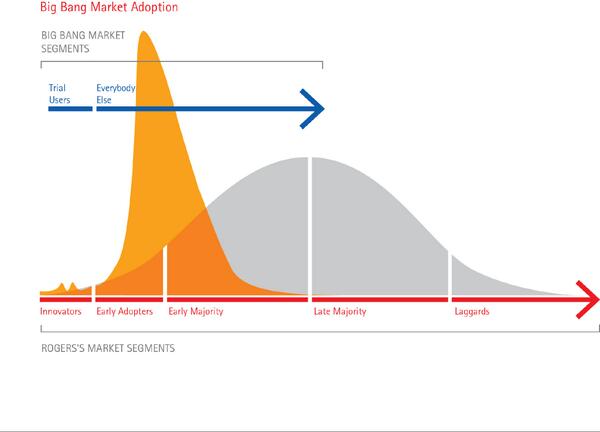Every new year sees a slew of top 5 and top 10 lists looking backwards. Here’s one that looks forward, predicting the five biggest disruptive technologies and threatened industries for 2014.
Making projections like these is really hard. Brilliant pundit Larry Downes titles his new book (co-authored with Paul Nunes) Big Bang Disruption: Strategy In an Age of Devastating Innovation. Its thesis is that with the advent of digital technology, entire product lines — indeed whole markets — can be rapidly obliterated as customers defect en masse and flock to a product that is better, cheaper, quicker, smaller, more personalized and convenient all at once.
Since adoption is increasingly all-at-once or never, saturation is reached much sooner in the life of a successful new product. So even those who launch these “Big Bang Disruptors” — new products and services that enter the market better and cheaper than established products seemingly overnight — need to prepare to scale down just as quickly as they scaled up, ready with their next disruptor (or to exit the market and take their assets to another industry).
Disruptors can come out of nowhere and happen so quickly and on such a large scale that it is hard to predict or defend against. “Sustainable advantage” is a concept alien to today’s technology markets. The reputation of the enterprise, aggregated customer bases, low-cost supply chains, access to capital and the like — all things that once gave an edge to incumbents — largely no longer exist or are equally available to far smaller upstarts. That’s extremely unsettling for business leaders because their function is no longer managing the present but inventing the future…all the time.
I certainly have no crystal ball. Yet just as makers of stand-alone vehicle GPS navigation devices were overwhelmed in 2013, suddenly and seemingly out of nowhere, by smartphone maps-app software, e.g., Google Maps, etc., so too do these iconic industries and services face a very real and immediate threat of big bang disruption this year.
- Chain Stores. Brick-and-mortar merchants may be fighting back against online sellers with technology, but the retail customer experience itself is under attack. Mobile devices, social media, 24/7 connectivity and a blurring of lines between historically separate customer service “channels” have upended the rules of retail, forever disrupting the notion of business as usual. So much so that venerable trade magazine Chain Store Age is sponsoring its first Customer Disruption conference in Redwood Shores next May.
- Hard Drives. Just ten years ago a 500 MB hard drive was big, slow and unaffordable. Today solid state memory (think iPhones and Chromebooks) is the flavor of the day. Yet with the growth of cloud-based digital storage — and an anticipated 2014 IPO by segment-leading DropBox — the wheels may come off the hard drive industry. Consumers have increasingly little need for local storage, let alone external drives, and the cost of hardware continues Moore’s Law inexorably down. Oracle’s Larry Ellison called them “network computers” at the turn of the century. He was right, just too early. The impact of cloud computing on digital storage will continue unabated, likely putting both the traditional PC and hard drive in the same category as the archaic 3.5″ floppy disk.
- Linear Television. “Linear” is the term for old-fashioned television, in which content is channelized and available to all viewers in a single, common time slot. While some politicians would like to outlaw channel packaging in favor of a la carte television, the bigger threat in 2014 is that IP-based video will overcome its cord-cutting connotations to become an integral part of every household. From smart TVs to binge-viewing and Chromecast, from ubiquitous DVRs and screen sharing apps to over-the-top only series like Netflix’s House of Cards, the stars seem aligned for streaming television to really go mainstream. This won’t put the cable and fiber television distributors out of business, but it will surely force them to react in pricing, marketing and the ever-absent customer service. This was a huge topic at CES in Las Vegas, and understandably so.
- Conference Calls. The conference call is a value-added telecom service that has changed very little in the past two decades. Few things in business are more frustrating. First off, we can’t tell who’s talking, so we pretend; we inevitably talk over each other, then stop and apologize over each other; and when we want to say something privately to an associate, we can’t without other people hearing it. Yes, free conference services have changed the dynamics of payment, but with more mobile devices than people in the world, the scale exists today to do for conference calling what GoToMeeting and WebEx have done to presentations. Yahoo’s purchase of Rondee in June was a harbinger. UberConference, hot off winning the top prize at TechCrunch Disrupt NYC, aims boldly to revolutionize conference calling — its tag line is “We’re the stress-free conference call. Never need a PIN. Never ask ‘who joined’ or ‘who said that?'” — and may just succeed.
- Realtors. It happened to travel agents and retail stock brokers and is now hitting taxi drivers: disintermediation and crowdsourcing (from Travelocity to Zipcar and Uber) render old occupations either unprofitable or irrelevant. LegalZoom, for instance, has brought quality legal products to the mass market, leading to a massive paradigm shift in the profession. With the advent of home stagers and the revival of residential real estate sales in the U.S., will 2014 be the year in which Zillow, Trulia and the like make FSBO real estate transactions a reality? The days of 6% “standard” commissions seem doomed, and as Downes incisively notes in Big Bang Disruption, regulated industries like real estate are especially vulnerable to information-driven disruption — if the law stays neutral and out of the way.
We all know intuitively that Downes is right: disruption is getting bigger and faster and more baked into today’s business world. Whether these are actually the top five disruptions of 2014 is something only time will tell. But if I missed any (which is surely the case) let the comments flow!
Originally prepared for and reposted with permission of the Disruptive Competition Project.



Leave a Reply